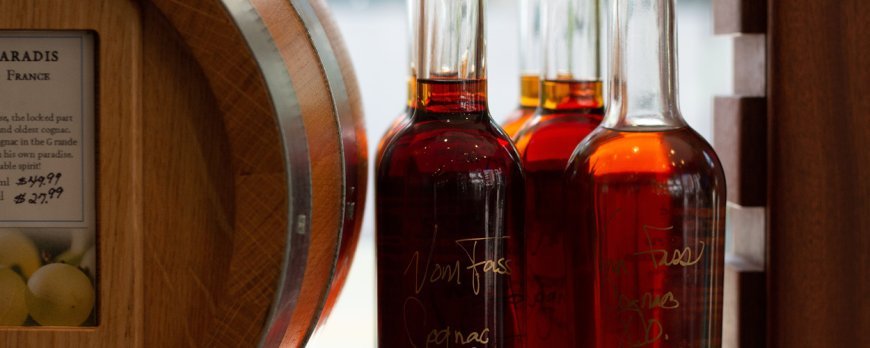How do you stop someone from drinking naturally?
Explore our guide on 'How do you stop someone from drinking naturally?' - Learn effective strategies for natural alcohol withdrawal and recovery.

How do you stop someone from drinking naturally?
Quitting alcohol naturally can be challenging, but it is possible to support someone in their journey towards sobriety using natural methods. For daily or heavy drinkers, it is important to seek medical supervision when quitting alcohol, as withdrawal can be dangerous. However, for moderate drinkers, there are several home remedies and herbal supplements that may assist in transitioning to an alcohol-free lifestyle.
Key Takeaways:
- Quitting alcohol naturally requires a tailored approach that considers individual needs and circumstances.
- For daily or heavy drinkers, medical supervision is essential to ensure a safe withdrawal process.
- Home remedies like meditation, exercise, and herbal supplements can be beneficial for moderate drinkers seeking to reduce alcohol consumption.
- Herbal supplements such as kudzu extract, ashwagandha, milk thistle, and St. John's wort have shown potential in reducing alcohol intake and alleviating withdrawal symptoms.
- Lifestyle changes, including improving diet, exercising, getting enough sleep, and reducing stress, can support the natural process of quitting alcohol.
- Seeking professional support through online counseling, support groups, behavioral health therapies, and intensive outpatient treatment can greatly enhance the chances of successfully quitting alcohol naturally.
- It is important to remember that everyone's journey to quitting alcohol is unique, and professional medical advice should always be sought.
Understanding the dangers of alcohol withdrawal
Before embarking on a natural approach to quit drinking, it's crucial to recognize the potential risks involved, particularly for individuals who consume alcohol on a daily or heavy basis. Alcohol withdrawal can be a serious and potentially life-threatening condition, characterized by a range of physical and psychological symptoms.
Common symptoms of alcohol withdrawal include tremors, sweating, anxiety, irritability, nausea, insomnia, and even seizures. In severe cases, delirium tremens (DTs) can occur, which presents with confusion, hallucinations, and intense agitation. Therefore, it is important to seek medical supervision when considering quitting alcohol, especially for those with a history of heavy or prolonged drinking.

Recognizing the importance of medical guidance
If you or someone you know is a heavy or daily drinker, it is crucial to consult with a healthcare professional who can provide guidance and support throughout the process of quitting. Medical supervision will ensure a safe and effective approach to quitting alcohol, while also addressing any potential complications that may arise during withdrawal.
Quitting alcohol naturally can still be an option for individuals who are moderate drinkers and do not experience severe withdrawal symptoms. However, it is important to be aware of the potential risks and seek medical advice if any concerns arise during the process.
Remember, everyone's journey to quitting alcohol is unique, and what works for one person may not work for another. It is always best to consult with a healthcare professional who can provide personalized guidance based on your specific needs and circumstances.
Home Remedies for Moderate Drinkers
Moderate drinkers may find relief in natural remedies that can support their journey towards quitting alcohol. These remedies can assist in alleviating cravings, reducing withdrawal symptoms, and promoting overall well-being. Here are some effective home remedies that may aid moderate drinkers in their quest to live an alcohol-free life:
- Meditation: Practicing meditation can help calm the mind and reduce stress, which are often triggers for drinking. Incorporating mindfulness techniques into daily routines can promote self-awareness and help moderate drinkers develop healthier coping mechanisms.
- Exercise: Engaging in regular physical activity can have multiple benefits for individuals looking to quit drinking. Exercise releases endorphins, which can elevate mood and reduce cravings. It also serves as a productive and positive outlet for stress, helping moderate drinkers redirect their energy towards fitness goals.
- Herbal supplements: Certain herbal supplements have been found to support alcohol addiction recovery. For example, kudzu extract has shown promise in reducing binge drinking and overall alcohol consumption. Ashwagandha may help alleviate alcohol withdrawal symptoms and cravings. Milk thistle is believed to restore liver health, which can be affected by chronic alcohol consumption. St. John's wort may help reduce alcohol intake and relieve withdrawal symptoms.
While these home remedies can be beneficial, it's important to remember that they should be used as part of a comprehensive approach to quitting alcohol. Moderate drinkers should consult with a healthcare professional or addiction specialist to ensure these remedies are suitable for their individual circumstances. Additionally, incorporating positive lifestyle changes such as improving diet, getting enough sleep, and reducing stress can further enhance the effectiveness of these natural remedies.
Seeking support is crucial on the journey to quitting alcohol. Online counseling, support groups, and behavioral health therapies can provide the necessary guidance and encouragement. In some cases, intensive outpatient treatment may be recommended for more comprehensive support. Remember, each person's experience with quitting alcohol is unique, and professional medical advice should always be sought.
Herbal supplements for alcohol withdrawal and cravings
Herbal supplements can serve as a natural approach to overcoming alcoholism, helping individuals reduce their alcohol consumption and manage withdrawal symptoms. When combined with other lifestyle changes, these supplements can provide additional support during the journey to sobriety.
Here are some herbal supplements that have shown promise in assisting with alcohol withdrawal and cravings:
- Kudzu extract: This herbal remedy has been found to reduce binge drinking and overall alcohol consumption. It can help curb cravings and support a gradual reduction in alcohol intake.
- Ashwagandha: Known for its adaptogenic properties, ashwagandha may help alleviate alcohol withdrawal symptoms and cravings. It can promote relaxation, reduce stress, and support emotional well-being during the recovery process.
- Milk thistle: This herb is believed to support liver health, which can be affected by prolonged alcohol consumption. Milk thistle may aid in detoxification and help restore normal liver function.
- St. John's wort: Widely known for its mood-enhancing properties, St. John's wort may also assist in reducing alcohol intake and relieving withdrawal symptoms. It can help stabilize mood and support mental well-being throughout the recovery journey.
While herbal supplements can be beneficial, it's important to consult with a healthcare professional before incorporating them into your alcohol cessation plan. They can provide guidance on appropriate dosage, potential interactions with other medications, and ensure these supplements align with your individual needs.
Kudzu extract - curbing binge drinking and alcohol consumption
Kudzu extract is a natural remedy that has shown promise in curbing binge drinking tendencies and reducing overall alcohol consumption. Derived from the roots of the kudzu plant, this herbal supplement has long been used in traditional Chinese medicine for its many health benefits. Recent research suggests that kudzu extract may also have a positive impact on alcohol addiction.
One of the key ways in which kudzu extract may help individuals reduce alcohol intake is by decreasing the desire for alcohol. It is believed to do this by affecting neurotransmitters in the brain that are responsible for regulating pleasure and reward. By reducing cravings, kudzu extract may assist individuals in breaking the cycle of excessive alcohol consumption.
Additionally, kudzu extract has been found to have potential benefits in the context of alcohol withdrawal. Alcohol withdrawal can be a challenging and uncomfortable process for heavy drinkers, often characterized by symptoms such as anxiety, insomnia, and irritability. Kudzu extract may help alleviate these symptoms and support individuals in their journey towards sobriety.
It is important to note that while kudzu extract shows promise as a natural solution for alcohol dependency, it is not a standalone cure. Combining the use of kudzu extract with other lifestyle changes, such as seeking professional counseling and therapy, making healthier choices, and engaging in a supportive community, can increase the chances of successful recovery. Each individual's journey to quitting alcohol is unique, and it is crucial to consult with a healthcare professional to determine the most appropriate approach for their specific needs.
Ashwagandha - Easing Alcohol Withdrawal and Cravings
Ashwagandha, an herbal supplement, may offer support in managing alcohol withdrawal symptoms and reducing cravings. This natural remedy has been used for centuries in Ayurvedic medicine and is known for its adaptogenic properties, which can help the body adapt to stress and maintain balance.
When it comes to quitting drinking naturally, ashwagandha may provide a gentle approach to easing alcohol withdrawal symptoms. Research suggests that ashwagandha can help reduce anxiety, which is a common symptom experienced during the early stages of alcohol withdrawal. By promoting a sense of calmness and relaxation, ashwagandha may make it easier for individuals to cope with the discomfort associated with quitting alcohol.
Additionally, ashwagandha may help reduce cravings for alcohol. Studies have shown that ashwagandha extract can help regulate dopamine levels in the brain, which play a role in reward-seeking behavior. By balancing dopamine levels, ashwagandha may reduce the urge to drink and support individuals in their journey to sobriety.
It's important to note that while ashwagandha may offer support in managing alcohol withdrawal symptoms and reducing cravings, it should not replace professional medical advice. Each individual's journey to quitting alcohol is unique, and it's crucial to seek guidance from healthcare providers or addiction specialists who can provide personalized recommendations and support.
Milk thistle - Restoring liver health
Milk thistle is a natural remedy that holds potential for restoring liver health, which can be compromised by excessive alcohol consumption. The active ingredient in milk thistle, known as silymarin, has been found to have antioxidant and anti-inflammatory properties that may help protect and repair liver cells. By reducing inflammation and promoting the regeneration of liver tissue, milk thistle may contribute to the overall wellness of this vital organ.
In addition to its potential impact on liver health, milk thistle has been studied for its role in supporting detoxification processes. The liver is responsible for filtering out toxins, and milk thistle may help improve its function in this regard. While it is not a cure or replacement for medical treatment, incorporating milk thistle into a holistic approach to quitting alcohol may provide additional support to the body's natural processes.
To incorporate milk thistle into your routine, you can find it in various forms such as capsules, tinctures, or teas. It is important to follow the recommended dosage instructions and consult with a healthcare professional before starting any new supplement. Milk thistle should not be used as a substitute for medical treatment or professional advice, but rather as a complementary approach to support liver health during the process of quitting alcohol.
St. John's wort - reducing alcohol intake and relieving withdrawal symptoms
St. John's wort, a herbal supplement, has been associated with a reduction in alcohol intake and the alleviation of alcohol withdrawal symptoms. This natural remedy has gained attention for its potential benefits in supporting individuals on their journey to quit drinking. St. John's wort is believed to work by affecting certain neurotransmitters in the brain, which may help reduce alcohol cravings and the desire to consume alcohol.
In addition to its effects on reducing alcohol intake, St. John's wort has also been reported to alleviate alcohol withdrawal symptoms. These symptoms, which can include anxiety, restlessness, and insomnia, can be challenging to manage during the early stages of quitting alcohol. By potentially easing withdrawal symptoms, St. John's wort may provide individuals with a smoother transition to an alcohol-free lifestyle.
It is important to note that while St. John's wort shows promise in reducing alcohol intake and relieving withdrawal symptoms, it should be used under the guidance of a healthcare professional. This supplement can interact with other medications and may not be suitable for individuals with certain medical conditions. Seeking professional advice ensures that St. John's wort is used safely and effectively as part of an overall plan to quit drinking naturally.
When considering natural solutions for alcohol dependency, St. John's wort is just one of the many options available. Each person's journey to quitting alcohol is unique, and what works for one individual may not work for another. It is important to explore a variety of approaches, such as herbal supplements, lifestyle changes, and professional support, to find the combination that best supports long-term sobriety.
Lifestyle changes for quitting alcohol naturally

Making positive lifestyle changes can greatly enhance the success of quitting alcohol naturally. By adopting healthier habits and incorporating beneficial practices into daily routine, individuals can support their journey towards an alcohol-free life. Here are some effective methods to quit drinking:
- Improve your diet: Focus on consuming nutrient-rich foods, such as fruits, vegetables, whole grains, and lean proteins. A well-balanced diet can provide the body with the essential nutrients it needs to repair and heal.
- Engage in regular exercise: Physical activity not only helps distract from cravings but also releases endorphins, which promote a sense of well-being. Find an exercise routine that suits your interests and abilities, whether it's jogging, dancing, yoga, or swimming.
- Prioritize quality sleep: Aim for 7-9 hours of uninterrupted sleep each night. Quality sleep is crucial for overall well-being and can help improve mood, reduce stress, and enhance the body's natural healing processes.
- Reduce stress: Identify stress triggers and find healthy coping mechanisms to manage them. This can include engaging in relaxation techniques like meditation, deep breathing exercises, or practicing mindfulness.
Additionally, seeking support from online counseling platforms and participating in support groups can provide a valuable network of individuals who understand the challenges of quitting alcohol. Behavioral health therapies and intensive outpatient treatment programs can also offer personalized guidance and strategies to overcome addiction.
Remember, everyone's journey is unique
It's important to remember that quitting alcohol naturally is a highly individualized process. What works for one person may not work for another. Seeking professional medical advice is crucial to ensure a safe and effective path towards sobriety. Professionals can assess individual health needs, provide personalized guidance, and monitor progress throughout the journey.
By making positive lifestyle changes, seeking support, and consulting with medical professionals, individuals can increase their chances of successfully quitting alcohol naturally.
Seeking support through counseling and therapy
Professional support, such as online counseling and therapy, can significantly assist individuals in their journey to overcome alcoholism naturally. These resources provide a safe and confidential space for individuals to explore the root causes of their drinking habits, develop coping strategies, and learn healthier ways to manage stress and emotions. Online counseling platforms offer convenient access to licensed professionals who specialize in addiction treatment and recovery.

Benefits of seeking professional support:
- Access to experienced therapists who understand the complexities of addiction and can provide personalized guidance
- Development of a customized treatment plan tailored to individual needs and goals
- Opportunity to explore underlying issues, traumas, or mental health conditions that may contribute to alcohol dependency
- Evidence-based therapies such as cognitive-behavioral therapy (CBT) and motivational interviewing (MI) that help individuals change their thought patterns and behaviors around alcohol
Support groups and behavioral health therapies:
- Joining a support group, such as Alcoholics Anonymous (AA), can offer a sense of community and encouragement from individuals who have faced similar challenges
- Behavioral health therapies, such as dialectical behavior therapy (DBT) or acceptance and commitment therapy (ACT), can provide valuable skills and strategies to overcome cravings, manage triggers, and build a fulfilling life without alcohol
Intensive outpatient treatment programs may also be an option for individuals who require more structured support. These programs typically involve a combination of individual and group therapy, education about addiction and recovery, and ongoing monitoring and accountability.
Individualized Approach and Medical Advice
It is essential to remember that individualized approaches and professional medical advice are vital components of successfully quitting alcohol naturally. While natural remedies and lifestyle changes can be beneficial for many individuals, it is important to recognize that each person's journey to sobriety is unique.
Seeking personalized guidance from healthcare professionals, such as doctors, therapists, and addiction specialists, can provide valuable support and ensure a safe and effective quitting process. These experts can assess your specific needs, offer tailored strategies, and monitor your progress throughout your alcohol-free journey.
Additionally, they can help you navigate the potential challenges and risks associated with alcohol withdrawal, especially for individuals who have been daily or heavy drinkers. With their guidance, you can develop a comprehensive plan that addresses physical, emotional, and psychological aspects of alcohol addiction, increasing your chances of long-term success.
Remember, quitting alcohol naturally requires a holistic approach that takes into account your unique circumstances and needs. Collaborating with healthcare professionals can offer you the necessary guidance, resources, and support to achieve your goal of living a healthy, alcohol-free life.
Conclusion
Quitting alcohol naturally is a complex process, but with the right support and a tailored approach, individuals can successfully overcome alcoholism and find lasting sobriety. It is important to note that for daily or heavy drinkers, quitting alcohol without medical supervision can be dangerous. However, for moderate drinkers, there are a variety of natural approaches that can be taken to transition to an alcohol-free lifestyle.
Home remedies such as meditation, exercise, and herbal supplements can play a significant role in the quitting process. Notable herbal supplements include kudzu extract, which has been shown to help reduce binge drinking and cut the amount of alcohol consumed, and ashwagandha, which may help alleviate alcohol withdrawal symptoms and cravings. Additionally, milk thistle is believed to restore liver health, which may be affected by prolonged alcohol consumption, while St. John's wort has the potential to reduce alcohol intake and relieve withdrawal symptoms.
In addition to incorporating home remedies, making lifestyle changes can greatly aid in the journey to quit drinking naturally. Simple adjustments like improving diet, engaging in regular exercise, getting enough sleep, and reducing stress levels can contribute to overall well-being and support the process of quitting alcohol.
Seeking professional support is crucial in overcoming alcohol addiction. Online counseling, support groups, and behavioral health therapies offer valuable resources and guidance. For those requiring more intensive treatment, considering intensive outpatient programs can provide the necessary structure and care. However, it is important to remember that quitting alcohol is a unique journey for each individual, and professional medical advice should always be sought to ensure safety and effectiveness.
FAQ
How do you stop someone from drinking naturally?
There are several approaches that can be taken to help someone stop drinking naturally. It is important to note that for daily or heavy drinkers, quitting alcohol without medical supervision can be dangerous. For moderate drinkers, home remedies like meditation, exercise, and herbal supplements may help with the transition to alcohol-free living.
What are the dangers of alcohol withdrawal?
Alcohol withdrawal can be dangerous, especially for daily or heavy drinkers. It is important to understand the potential risks and seek medical supervision when quitting alcohol. Withdrawal symptoms can range from mild to severe, and in some cases, can even be life-threatening.
What are some home remedies for moderate drinkers?
Moderate drinkers can try various home remedies to aid in quitting alcohol naturally. These may include meditation, exercise, and making changes to daily routines such as improving diet, getting enough sleep, and reducing stress. Seeking support from online counseling and support groups can also be beneficial.
Are there herbal supplements that can help with alcohol withdrawal and cravings?
Yes, there are herbal supplements that may help with alcohol withdrawal and cravings. Some supplements that have shown potential benefits include kudzu extract, ashwagandha, milk thistle, and St. John's wort. However, it is important to consult with a healthcare professional before starting any new supplement regimen.
How does kudzu extract help with curbing binge drinking and alcohol consumption?
Kudzu extract has been shown to help reduce binge drinking and cut the amount of alcohol consumed. It may have an impact on alcohol metabolism and reduce alcohol cravings, making it easier to abstain from excessive drinking.
Can ashwagandha ease alcohol withdrawal and cravings?
Ashwagandha is believed to have properties that can help with alcohol withdrawal and cravings. It may help reduce anxiety and stress, which are common triggers for alcohol cravings, making it easier to resist the urge to drink.
Does milk thistle restore liver health?
Milk thistle is believed to have liver-protective properties and may help restore liver health. Prolonged alcohol consumption can have damaging effects on the liver, and milk thistle may assist in repairing and detoxifying the liver.
Can St. John's wort reduce alcohol intake and relieve withdrawal symptoms?
St. John's wort has shown potential in reducing alcohol intake and relieving withdrawal symptoms, although more research is needed to fully understand its mechanisms of action. It may help regulate mood and reduce anxiety, making it easier to quit alcohol.
What lifestyle changes can support quitting alcohol naturally?
Making changes to daily routine can be helpful in quitting alcohol naturally. This may include improving diet, exercising regularly, getting enough sleep, and reducing stress. These changes can contribute to overall well-being and make the transition to an alcohol-free lifestyle smoother.
How can counseling and therapy support the process of quitting alcohol naturally?
Seeking support through online counseling, support groups, behavioral health therapies, and intensive outpatient treatment can provide valuable guidance and support during the process of quitting alcohol naturally. It allows individuals to address underlying issues, learn coping strategies, and develop a strong support network.
Why is an individualized approach and medical advice important?
It is crucial to recognize that everyone's journey to quitting alcohol is unique. Professional medical advice should always be sought to ensure safety and to tailor treatment plans to individual needs. Healthcare professionals can provide guidance, monitor progress, and address any potential medical complications that may arise during the process of quitting alcohol naturally.

































































































































